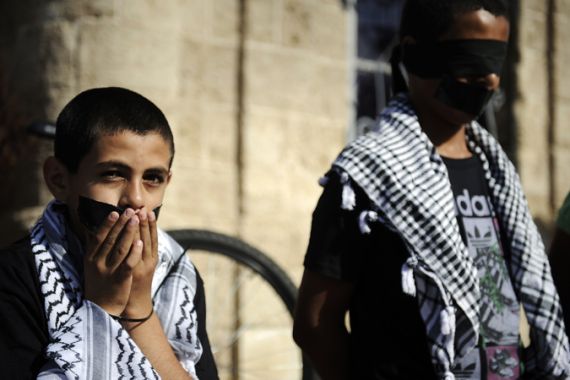Israel and Palestinians ‘committed to peace’
Both sides issue rare joint statement, saying they are committed to achieving peace through “exchange of letters”.

Israel and the Palestinian Authority have issued a rare joint statement saying both are committed to peace, after Prime Minister Benjamin Netanyahu dispatched an envoy to meet Palestinian President Mahmoud Abbas.
Netanyahu’s office issued the joint statement on Saturday after envoy Yitzhak Molcho met Abbas in Ramallah, the Palestinian Authority’s administrative capital.
“Israel and the Palestinian Authority are committed to achieving peace and the sides hope that the exchange of letters between President Abbas and Prime Minister Netanyahu will further this goal,” the statement said.
The envoy carried a letter from Netanyahu replying to one he received last month from Abbas, in which the Palestinian leader stated his grievances over the collapse of peace talks in 2010 and laid out his parameters for a resumption of negotiations.
Details of Netanyahu’s letter were not released, but Israeli officials said last week that they did not expect him to accept a key Palestinian demand to halt all settlement building in the occupied territories before reopening any talks.
Nabil Shaath, the Palestinian negotiator, said Abbas’s April letter was meant to challenge the Israeli leader over the collapse of the peace process and “put Mr Netanyahu on the spot.”
In it, Abbas asked Israel to outline “as soon as possible” its positions on four key issues: the principle of a two-state solution based borders prior to the 1967 war, halting settlement activity, releasing all Palestinian prisoners and revoking all decisions that undermine bilateral agreements since 2000.
“We stand ready to immediately resume negotiations the minute we receive your positive response on these points,” Abbas wrote.
Netanyahu has repeatedly called on Abbas to return to talks without any pre-conditions and promised that Israel was ready to make concessions, if the Palestinians would also compromise.
Palestinian negotiator Saeb Erakat has already warned that in the absence of a favourable response from Netanyahu, Abbas would renew his campaign for United Nations membership for a Palestinian state in the General Assembly, in the Security Council and in all other UN bodies.
Flicker of hope
Few diplomats expect any breakthrough ahead of presidential elections in the United States in November, however the surprise formation of a national unity government in Israel last week has provided a slight flicker of hope.
Netanyahu stunned the political establishment on May 8 by hooking up with the main opposition group, the centrist Kadima party, to form one of the biggest coalitions in Israeli history.
The head of Kadima, Shaul Mofaz, has long blamed Netanyahu for the failure of the peace talks and told reporters last week that entering new negotiations “was an iron condition for forming the unity government”.
“I hope Abbas will use this opportunity to resume the peace negotiations. I don’t know how you advance negotiations without engaging in them,” Netanyahu said at the time.
The Palestine Liberation Organisation’s executive committee is set to convene on Sunday to review Netanyahu’s letter.
“Tomorrow (Sunday) the PLO executive committee will meet to discuss what Netanyahu said in his letter and what steps we are going to take,” the PLO’s Wasel Abu Yusef told Reuters.
Before Abbas met Molcho, he received a call from US Secretary of State Hillary Clinton to discuss regional issues, Abbas’s office said. Clinton also spoke to Netanyahu mid-week to urge a resumption in negotiations.
US-sponsored peace talks froze in 2010 after Netanyahu rejected Palestinian demands that he extend a partial settlement construction freeze he had introduced at Washington’s behest.
About 500,000 Israeli settlers and 2.5 million Palestinians live in the West Bank and East Jerusalem, territory the
Palestinians want for an independent state.
The settlements are considered illegal by the International Court of Justice, the highest UN legal body for disputes. Israel cites historical and Biblical links to the land and says the status of settlements should only be decided in peace talks.